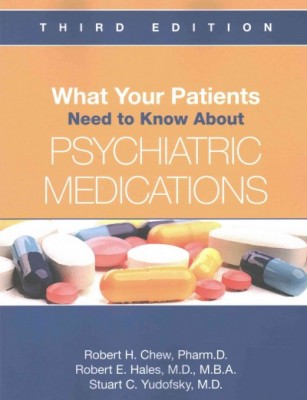| What Your Patients Need to Know about Psychiatric Medications Contributor(s): Chew, Robert H. (Author), Hales, Robert E. (Author), Yudofsky, Stuart C. (Author) |
|
 |
ISBN: 1585625086 ISBN-13: 9781585625086 Publisher: American Psychiatric Association Publishing OUR PRICE: $92.15 Product Type: Paperback Published: October 2016 |
| Additional Information |
| BISAC Categories: - Medical | Psychiatry - Psychopharmacology |
| Dewey: 615.788 |
| LCCN: 2016017361 |
| Physical Information: 1" H x 8.4" W x 10.9" (2.45 lbs) 485 pages |
| Descriptions, Reviews, Etc. |
| Publisher Description: Whether it is patients' anxiety at being in the physician's office, psychiatric disorders that may impair attention and concentration, skepticism at the effectiveness of medication, or the physician's own busyness, there are varied reasons why patients may not request all of the information they need about a psychiatric medication that is being prescribed or why physicians may not provide it. What Your Patients Need to Know About Psychiatric Medications, Third Edition, remedies this problem by offering clear, accurate, and accessible information on more than 70 medications from all of the major medication classes, from antianxiety medications such as diazepam and lorazepam, to antidepressants such as fluoxetine and sertraline, to stimulants for attention-deficit/hyperactivity disorder such as dexmethylphenidate and oral methylphenidate. Updated to reflect new medications that have come into the marketplace and changes to the dosing, format, and methods of prescription of existing medications, the book evaluates each medication in eight categories: - General information- Dosing information- Common side effects- Adverse reactions and precautions- Risk in during pregnancy and breast-feeding- Potential drug interactions- Overdose- Treatment summary With its quick-reference format, What Your Patients Need to Know About Psychiatric Medications, Third Edition, is not just an invaluable resource for clinical social workers, clinical psychiatrists, psychiatric nurses and residents, and community and psychiatric pharmacists. It is also a source of accessible, jargon-free guidance for patients, who can leave the physician's office with tangible material about their specific medication, which they can retain and refer to later. |